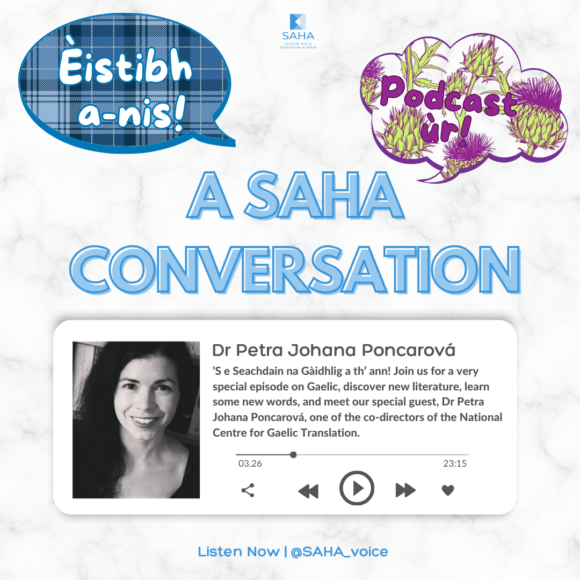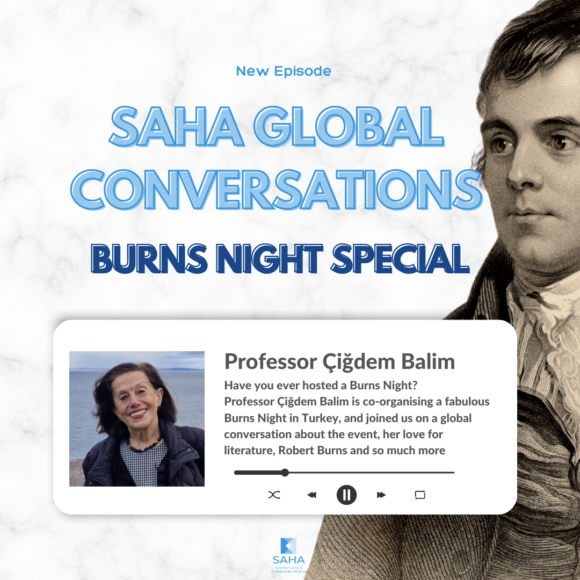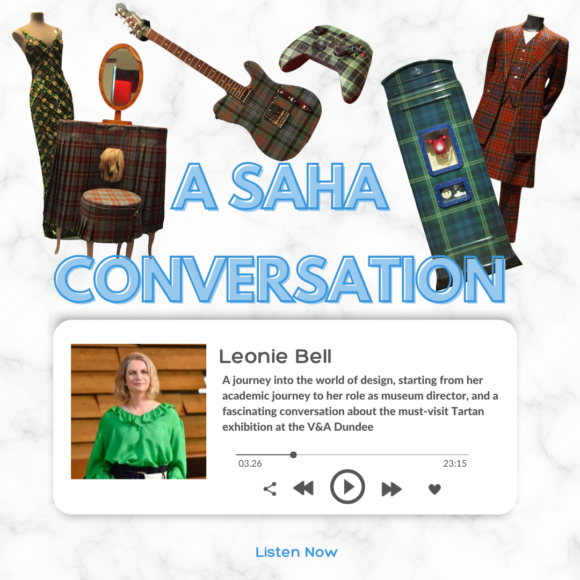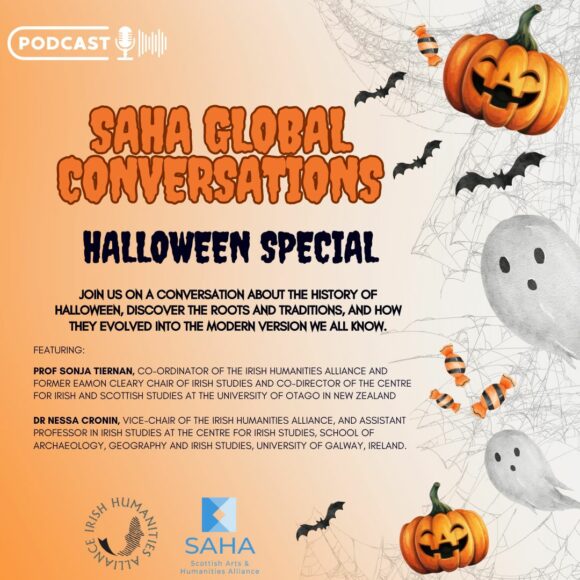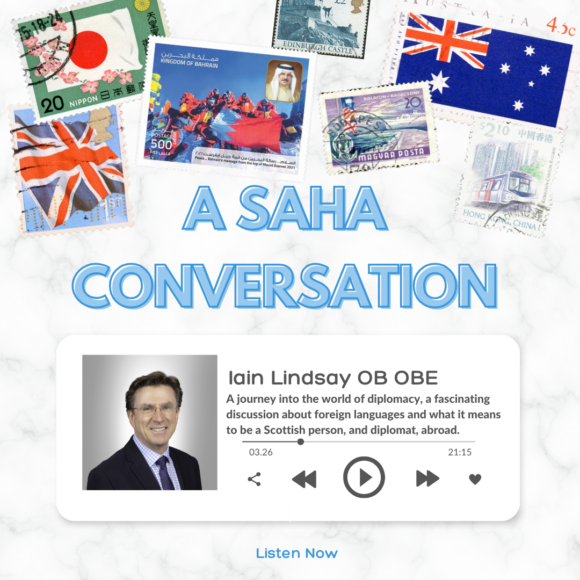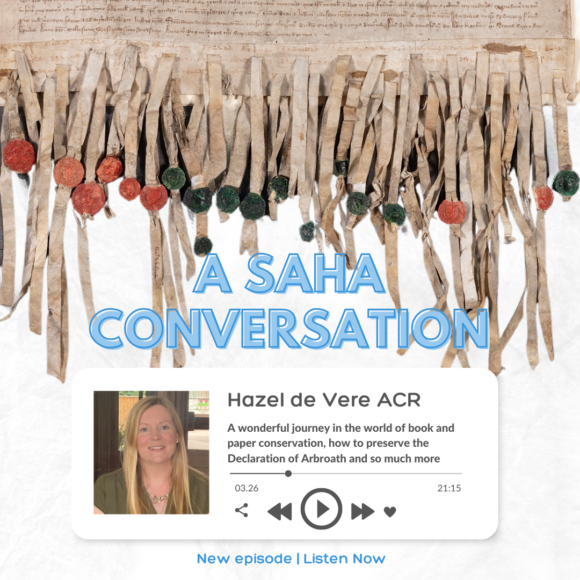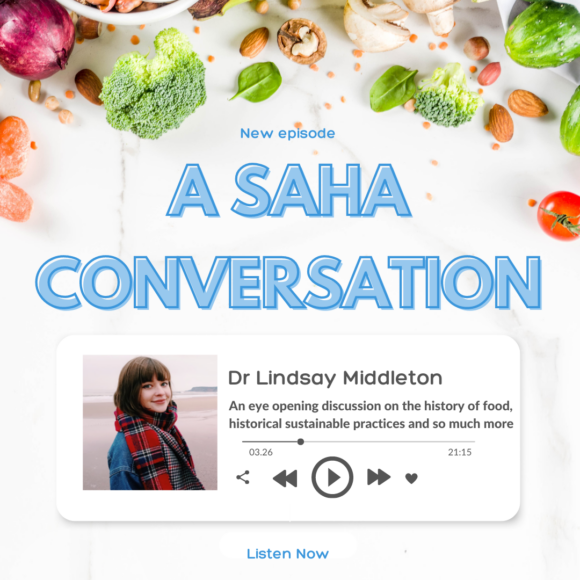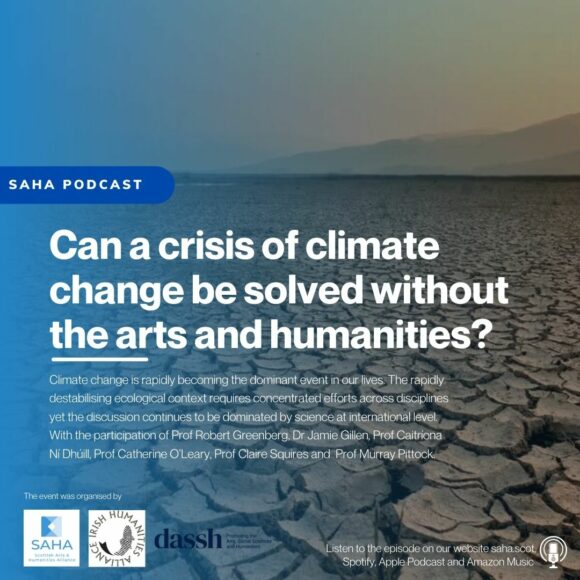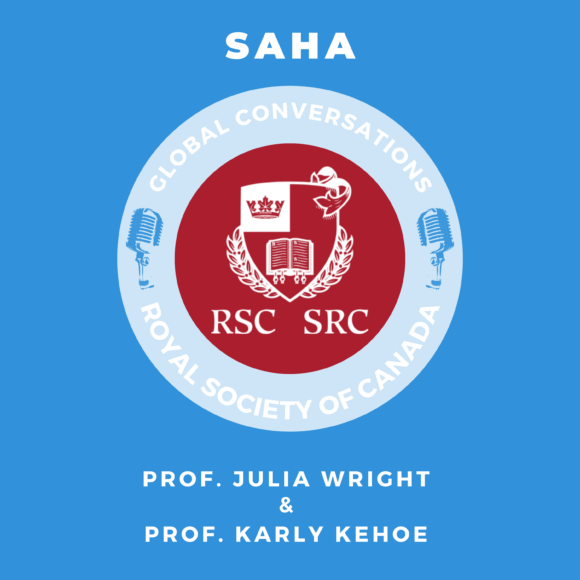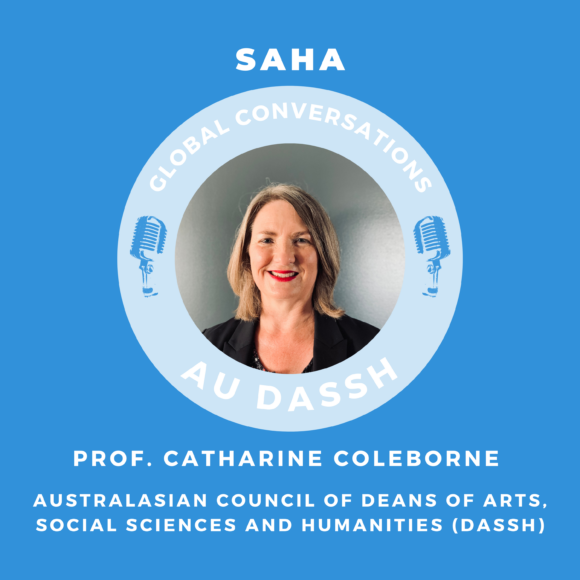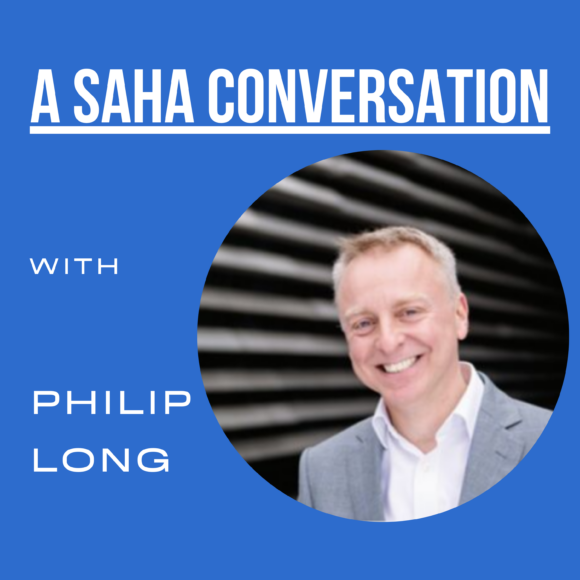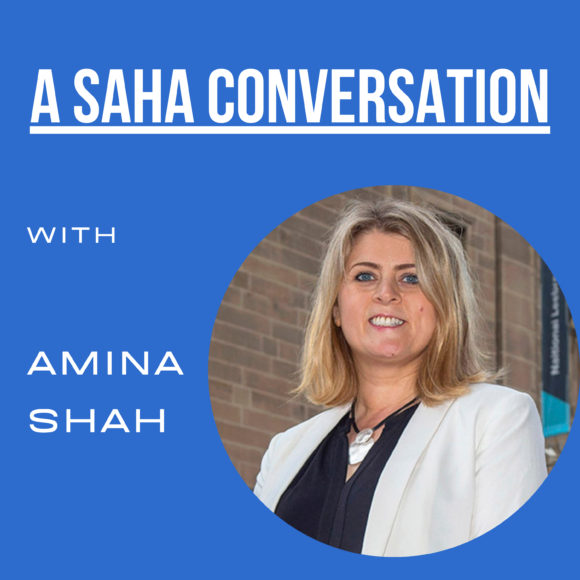In this new SAHA Conversation we are joined by Christine Wilson, Interim Director of Research and Policy Insight at the British Council. Christine has been with the British Council since 2004. She is responsible for a global research and insight portfolio spanning education, arts, youth and skills, as well as exploring the role of cultural relations in supporting the UK’s soft power and foreign policy. She is series editor of the Cultural Relations Collection, which encourages new thinking in this field.
She was previously Head of Research, responsible for global standards and practice, ethics and networks. She led the Next Generation research series, which aims to engage youth voices around the world and contribute to improved policy making, and has covered countries including Nigeria, Myanmar, Lebanon, Poland, the UK and Vietnam. In 2016-17, Christine was Director of the Hammamet Conference, an international platform for leaders from North Africa and the UK to engage in dialogue following the Arab Uprisings. In 2018, she co-chaired the steering group for Peace and Beyond, an international conference to encourage new thinking and research in peacebuilding and reconciliation, and edited the conference publication.
Christine is an Advisory Board member at the Institute for Advanced Studies in the Humanities (IASH) at the University of Edinburgh, and is a Fellow of the Royal Society of Arts (RSA). She has previously served on the board of the Scotland-Malawi Partnership, and on the Scotland Committees of the UNESCO UK National Commission and of the RSA. She has studied at the Universities of Edinburgh and Ulster, and the Open University. Prior to joining the British Council, Christine was a journalist focusing on politics and civil society in Scotland.
As it has become customary by now in this SAHA conversations we ask Christine to reflect on her career trajectory but we discuss other subjects also, such as her work on international cultural relations, decolonisation and ongoing research exploring young people’s ambitions and aspirations across the world.
Resources mentioned in this episode
 Transcript
Transcript
01:43 Cristina: Thank you for joining us today, Christine.
01:46 Christine: My pleasure, Cristina, good to be here.
01:46 Cristina: Just to start our discussion today, I wanted to ask you if you might be able to tell us a little bit about your educational background and your career trajectory. 01:58 Christine: Okay. So I moved to Edinburgh to come here to university in 1994. I came up initially planning to my MA, which is the degree you degree you get at Scottish universities obviously, in French and linguistics I think it was what I set out to do. But I found I didn’t quite enjoy the French as much as I thought I would and I switched and I actually switched a few times during my years at university. So I came away with a sort of MA general arts in 1998, because I’d also covered classics, I’d done a bit of work in archaeology.
02:31So I was jumping around quite a lot and not really quite sure what I wanted to do. And so the bit about a career trajectory in terms of what led me to the British Council, where I am now, was fairly sequitous. I actually worked for a while in a record shop in Edinburgh. I then worked for a record company. I then moved to work in a Scottish political magazine where I worked as a journalist and an editor for a little while. And it was at that time, it was actually a friend of mine who was working at the British Council, drew my attention to a post that was advertised as a project officer in what was then… we used to call governance, which was really around areas of interest in civil society, gender and so on.
03:14 And I think because of the work I’ve been doing at the magazine where I’ve written a lot about Scottish civil society and its interactions with Scottish politics, I was interested in the job and she spoke very highly of the British Council as a place to work. And that took me to the British Council. And that was in 2004. And I think since then, my career at the British Council has, has been on a fairly narrow path insofar as for a long time I stayed in that area of work around civil society, but I got more interested over time in some of the bigger issues that we were addressing as the organization and with our partners around the world.
03:53So that’s when I first went back to education and I went back to the Open University actually to do a Diploma in environmental policy. We were working quite a lot on climate change, and I really wanted to get a grip on some of the policy issues internationally. My work then changed again. I got more interested in knowledge and research engagement and knowledge exchange and how we should be doing more of that as an organization that generates a lot of data. And then subsequently went back to the University of Ulster a few years ago to do a Masters in social research skills, in particular focusing on undertaking research in conflict affected areas. So I think my, I guess my initial educational background didn’t really have a huge amount to do with where I ended up. But my education and career have been sort of intertwined quite neatly over the last 10 years or so.
04:51 Cristina: It’s amazing how you’ve had this thirst for learning and knowledge and found new ways to nourish it different degrees along the way. And actually your connections with academic life haven’t stopped as you mentioned with the last degree, because you now sit on the board for the Institute of Advanced Studies in Humanities at the University of Edinburgh, one of our SAHA member institutions. So I wanted to ask you a little bit about this role and what drew you to take this on this role on the on the board of IASH and also what have you learned since you’ve taken this role about the field of humanities, more widely?
05:41 Christine: So I joined the board of IASH quite a few years ago now and it was at the invitation of Susan Lanning who was then the director, our much beloved and much missed, unfortunately, Susan. She and I were having a meeting and it was actually to do with my role at the British Council. I’d gone to meet her about some events where I thought there could be joint interest between the British Council and IASH. And we just got talking in her, her study that afternoon and she gave me tea and we had a great chat and I was just really interested in what she was talking about and anyway, we came to an agreement that there was some work we were going to do together. And then for me, rather after the blue, a few weeks later, I received an invitation to join the board of IASH. And I was delighted. I was slightly intimidated I have to say. Susan herself was a great mind she wore her intellect very lightly, but she was, she was quite extraordinary. And I knew that she and other members of the board were also quite extraordinary and I felt that, well, you know, I’m not a PhD, I’m not professor. What can I, what can I really bring? But as it was, you know, the IASH board members at the time were all delightful and very welcoming. And I think I soon discovered that there was something to offer in terms of the international engagement that I was, that I was party to through the British Council. And I think also some of that real world experience of applied research, I think most of the colleagues in one way or another do apply their research.
07:14 But I think there’s sort of breadth of what we can do at British Council was of interest to a lot of the members. And I think they also recognize that I did have that interest in, in knowledge exchange and thinking about how IASH could engage with the university more broadly, but certainly the city of Edinburgh, I think a little bit more broadly, and having someone who wasn’t coming at that from a purely academic background was, was useful I think. And I I’d say IASH has actually done that really well over the last few years, not just due to me due to some of the fantastic staff, some of the engagement around the dangerous women project for example. And that that in terms of your second question, about what I’ve learned, I think I have really learned to appreciate the breadth of what can be discussed under the umbrella of, of the humanities.
08:06 I think I’ve, I’m constantly hearing about new things or constantly being challenged to understand how the field of humanities is keeping up with the challenges of the wider world. So I think the field of digital humanities, I’m too old, I think to be considered digital native. So some of the things that the fellows, the Irish scholars are doing in that field is quite extraordinary. I think some of the ways that the really transdisciplinary approaches you get within humanities, the real imagination of how problems should be addressed, how problems should be solved is always quite inspiring to me, to be honest. So I remember one of the events we used to have, I guess, pre-pandemic, a little bit more regularly at the IASH building where board members would be invited in and we’d get short presentations from some of the scholars that were there at the time and just hearing people talking about, you know, mapping, you know, sort of archaeological mapping technology, but it was being used to, you know, to talk about climate change, resilience. Things like that are just always quite staggering to me. And I think IASH itself is such a haven of learning, but it’s also not an ivory tower. It’s so connected into real world issues. And I think that’s the absolute best of the humanities.
09:32 Cristina: I absolutely agree with you. I look at the work of the Institute, through my work on SAHA, but also personal interest in it’s amazing what they have on and the breadth of fellowship, also, the topics that they support. You’ve mentioned the British Council already and I wanted to ask you, you have worked on research at the British Council for a while now. And of course the institution covers a lot of fields of activities, but I wanted to ask you, given what you’ve observed from the projects over the years, how do you think arts and humanities research and projects that are not necessarily academic, but wider projects can help us address the big societal challenges that we’re facing at the minute?
10:23 Christine: It’s a good question. And it’s very nice of you to say I’ve worked as head of research at the British Council for quite a while. That is indeed true. Overall, I’ve been at the British Council about 17 years, but guess, I’ve been working in the research field and in one way or another at the British Council for nine or 10 of those. So for me, I always have to remember, and I occasionally have to be reminded that, you know, the British Council is not per se a research organization. So we are not undertaking research at any time, just for the sake of the knowledge and that the sort of enjoyment and pleasure of knowledge. So everything we do needs to be applied. Everything we do, we are doing for a purpose and a practicable purpose, whether that’s to find out things internally that we can apply ourselves in the way that we develop policy and strategy, or whether it’s in terms of informing our stakeholders or some of the participants in our projects.
11:16 So I think arts and humanities research it’s … when it comes to some of the big global challenges and let’s take climate change timely. We’re obviously talking about this just before COP, the British Council has a big piece of programming at the moment called the Climate Connection. It’s obvious I think to anyone who really engages with climate change, that while scientific and technological research and innovation plays an enormous role in things like carbon capture and storage or better energy production, or the way that, you know, the way that our houses and homes are heated and run, for example. Huge amounts of what is needed in order to change, have to stem from, from ourselves as human beings and as cultured human beings. And so it’s arts and humanities research that I think can unlock some of those answers and solutions. And I think that point about culture is really important because, you know, I think, I think bringing in psychology and, you know, understanding what it is that makes people change their behaviour. What do people respond well to is important, but even some of the underlying aspects of, you know, how we engage in the world how different cultures, different societies engage in the world is so deeply involved by their cultural history and background that if you forget that and you don’t look into that and you don’t apply research methodology to that, then you won’t make sustainable change.
12:40 So there’s an absolutely fascinating and to me, completely new area of humanities that I was introduced to late last year, early this year, as part of a series of essays that I commissioned as part of our climate change project. And that introduced me to the energy humanities. And all my time at IASH I’d never heard of the energy humanities, but the author of this particular essay was talking about the fact that actually our energy, the way we use energy and the way we produce energy massively affects the culture that you live in. And you see that in literature and you see that in film and you need to be able to understand energy as something of the humanities, as well as something of the sciences if you want to change it. There’s I think there’s a new book out now, I think it might be a January Paxman book and I confess I haven’t read it yet, but I know he’s talking about the, sort of the history of coal mining, particularly in England, I think. And you can’t really, you can’t separate out coal as coal mining and there’s something we did, people have done to heat their homes, a heavy industry from how it impacted on whole societies and communities is in certain areas of the country. And how that is ingrained in the way that those societies, their communities, those people see themselves, see their place in the world.
13:56 So I think if we separate out all of our arts and humanities research from our scientific research, then you cannot possibly think about addressing these sort of big societal challenges such as climate change, or, or COVID for example. We always have to be aware that human beings are complex creatures, who won’t just respond to a technological innovation. And I do think, I, I know it’s a little bit of a cliché, but I think the point about arts and humanities research and practice, the ability to imagine, and to think differently is absolutely crucial again in addressing the major challenges that we’re in. I think most arts and humanities research would demonstrate that time and time again. I have worked on a lots and lots of different types of research, and I’ve worked with lots of different countries and communities in order to do that. But I think the best research that we do, and the best results we get, that we can then apply in our programming and our policy development work will have as much a range as possible of disciplines within them and will be always transdisciplinary in the approach.
15:01 Cristina: You’ve mentioned COVID 19, which is something that we’re still facing day-to-day at the minute. I was wondering if you had any thoughts about how this has influenced work that is done at the minute in humanities, but also if it might leave any traces in the future of the field.
15:23 Christine: Well, I don’t know. I’m sure it’s only terribly foolish people that try and predict the future but I’m happy to have a go. I think, I mean, in terms of impact, we see and influence of COVID-19 pandemic I think absolutely. I think it’s amplified a lot of things that were already happening, I guess, you know, it’s public discourse about trust in science, you know, it was really thrown onto centre stage by COVID-19 and we see that today and we see that ongoing. And so I think for me, the need for good science wherever it’s coming from, good research is as needed as it ever was before and probably more so. I think the opportunities, the need for collaboration, genuine international collaboration have again been highlighted. And I think that the need for sensible intercultural connections as well have been turned up by COVID-19. And the fact that people have striven to do that despite the massive restrictions placed on them, you know, in terms of cooperation, in terms of traveling, working together. I think people with curious minds will always try to reach out to others and collaborate. And I guess that brings me on to the next point about the future. The COVID-19 accelerated something that was already happening, I think in terms of our ability to engage digitally.
16:44 What isn’t yet clear I think is exactly what impact that has had on the area of work I’m interested in professionally, which is how we build trust and engagement between peoples around the world. You know, I know there is research that suggests that in conflict affected situation, some of these computer mediated conversations and computer mediated interactions are actually quite helpful in terms of building trust between parties who don’t necessarily agree with each other, because you don’t have that physical space in which people can congregate in tribes. You don’t necessarily have the sort of sense of intimidation by another group, physically, if you were all engaging in this very flat online way. But the flatness perhaps is a problem in that you don’t necessarily get as much of the genuine human interaction as you would want in terms of building those long-term sustainable relationship. So I think we don’t yet know quite what the impact will be. We have some research that was published earlier this year, that looked at some of the impacts of COVID on cultural relations. And we looked at two areas in particular, the impact on festivals and the impact more broadly on the arts and on science collaboration.
18:00 And I think it threw up some of the things you would expect. One in particular that a lot of smaller organizations actually turned out to be more fleet of foot in terms of how they could pivot online and continue to engage their communities quite effectively, whereas some of the major organizations and in this I’m talking about you know big festivals and so on, just weren’t able to do that. And the argument I think is they’re not used to having to innovate in quite the same way. They’re not as creative and imaginative as perhaps they could be. And I think there is absolutely a truth in saying that in terms of people being able to engage in conferences and seminars and so on, not to have to travel, not to have to deal with visas, not to have to do all of those things, opens up some of these intellectual academic experiences to a much, much wider audience. And even though there absolutely isn’t digital equality in the world, there are significant levels of digital reach globally. And you know, far, far more people than before are able to access, you know, a podcast or an online webinar or something like that by their mobile phone, than obviously you could possibly get into one room.
19:12 So I do think that there is, there has been an equalization of access to intellectual content and engagement. Obviously, what has …. you don’t get from that is the sort of level of networking and interaction that we had before. And what I’m interested in looking in the future is saying, if we stay with this, or if we stay with a sort of hybridized model of these sorts of events, does our interactions suffer? Does our engagement with other people suffer? Do we have to look at how we build relationships very differently? And will you actually end up with the sense that the privileged few will get to do the sort of physical and face-to-face interactions? It will be kept open for a much wider audience, which is good, but actually it’s quite … you’ll end up with a deeply two-tiered system that you didn’t have before. So I think there’s a lot of research to be done on that space, I’m quite looking forward to.
20:08 Cristina: You’ve already led me to my next question which was gonna probe a little bit more into international cultural relations, because as far as I’ve gathered you have a very strong interest in the area. And of course you are in a great position to look at this as one of the aims of the British Council relates to international cultural relations very closely. And I wanted to ask you a little bit more about what arts and humanities can do in this area. What have you noticed over the years?
20:43 Christine: Arts and humanities are absolutely central to what we do in cultural relations and in our research as well. I think in terms of our cultural relations practice, what we’re always interested in is how these things are applied. You know, what difference does it make to, to people on the ground? I am coming back to our point as an organization at the British Council it is about generating trust and engagement and building those relationships, people to people between the UK and the rest of the world. And again, if you think of human beings as creatures of culture, then, then you have to include the arts and humanities within that. So it’s within our programming because we work in education, we work in arts and culture. We work in areas like cultural heritage and so on. We obviously work in language learning and teaching and assessment. So it’s there within the sectors in which we work but I think it does trickle through in terms of our approach to everything. Because we are human-centred I think as an organization, obviously we do work with institutions and we do work with infrastructures and often that’s where we might want to be looking to influence and drive change. But I think fundamentally you don’t … you can’t do the sort of work we’re doing without engaging with the arts and humanities. So whether that’s about, you know, introducing different artists to each other, to generate some sort of intercultural dialogue and practice or whether it’s supporting people who work in education policy to learn from each other and to share experiences and to share ideas about what works or whether it’s looking at, you know, the role of girls and women in sport, in Sub-Saharan Africa, all of those things have to have, I think, a strong arts and humanities angle to them, just naturally in a way.
22:32 So I think without, I would say without the arts and humanities there is no international cultural relations.
22:36 Cristina: I agree with you. I actually did a little bit of work on, on that also during a postdoc that was looking mostly a EU policy around colonial heritage. And, we were looking through the lens of heritage diplomacy actually. I think the ideas that we had around building a decolonial take on heritage diplomacy were very much in tune with the notions of international cultural relations, which I think are becoming more and more predominant at the minute and an international stage, especially in the eve of COVID and how this has highlighted the way that science needs to collaborate at international level to drive this massive changes that we need.
23:23 Christine: Absolutely, and I think, I mean I’m lucky… Just come away from the 2021 conference of ICRRA, which is the International Cultural Relations Research Alliance. And that’s led by British Council in the UK and ifa in Germany. And that’s, that brings together culture relations practitioners and academics from around the world. We had three great keynotes last week and we’ve had a number of sort of smaller discussions this week. And tomorrow is the final session, the closed session for ICRRA members, looking at how a lot of what we’ve learnt actually relates to policy. We took a look in particular about issues of inequality, issues of cooperation, and obviously things like decolonization, decoloniality approaches came up within that. And in parallel at the British Council, we’re doing some work that is actually, we’re trying to ask ourselves the question: How do you do this? How do you practice international culture relations if you were also committed to decolonization and anti-racism sort of being actively involved in those spaces perhaps rather than just passively?
24:26 So if you’re an organization that was set up when we were, that has, has very, very strong values, I think, in terms of building trust and engagement, but at the same time has a clear mandated mission in terms of talking about the UK, how can you do that from a perspective of decolonization? Is it to do with power relations internally? Is it to do with the power relations you have with your stakeholders? And for me working in research, obviously it’s that central point about how we know, how we go about approaching knowledge, the knowledge that we value. And how we gather that and how we amplify that is, is absolutely central. And it’s something I wrestled with quite a lot because obviously I’ve, you know, all of my studies have been done within the sort of the Western, the European model of how you generate knowledge, how you assess knowledge and so on. So I’d think I still probably have too rigid an approach of understanding what good research and good knowledge production looks like. So I’m trying at the moment to challenge myself a little bit in order that I can then effectively challenge some of the stakeholders that I work with really to open up the knowledge that we have, because one, obviously the great blessing of working somewhere like the British Council and actually in IASH and other university settings as well, is you’re so blessed with the range of people that you’re hearing from and the range of different diverse opinions and, and sort of knowledge sets that people bring with them. And I think we haven’t yet quite cracked that as an organization in terms of what we put front and centre in those terms.
26:04 Cristina: Well, it’s a very difficult challenge to face and I think you are not the only organization that is dealing with this at the minute but some very important and big steps ahead I think I’ve noticed in the, in the last years.
26:20 Christine: It’s good to be having the conversation, I think is the point. I think it’s been silent for too long. I think now we just really need to tackle it head on.
26:30 Cristina: In terms of your work at the British Council, one project that I noticed, and it was very interesting – to move into our last part of the podcast – was the Next Generation programme, which was focused on young people across the world and it tried to map their views on different subjects, what they hope and what their aspirations are for the future. And I was wondering if you’ve noticed some, some trends across the world that are similar for our young generation. And then leading on from that, if the key study from the UK has highlighted any aspects that are particular to young people from the UK?
27:11 Christine: I’m glad you asked me about Next Generation because it is absolutely one of my favorite projects. And I was in fact, in a meeting early this morning, looking at some suppliers for a new next generation that we are doing in Indonesia. So yes, there absolutely are trends across Next Generation. So the program itself started back in 2009. In fact my colleagues in Pakistan were brilliant and came up with a really good piece of research that was, was absolutely fresh at the time in the country and it was also absolutely used really successfully in terms of impact on youth policy. So we then relaunched the project as a global programme in 2015, and we started with the UK because the point of the Next Generation was to look at aspirations of young people and to understand where they’re coming from, but often when the country is going through a time of change or when there’s a sort of maybe a confluence of events. So we did Colombia where we, we looked at young people’s role in bringing about the peace process. We did South Africa where it was 20 years after apartheid, what the South African youth think about the social contract that was supposed to have been generated. Was it really holding true for them? And let’s take another one. We did one in Germany looking at really the idea that Germany was sort of a leader in Europe but was facing, had been facing a lot of challenges to do with its policy on immigration, the potential rise of the far right and so on.
28:35 But wherever we’ve done the studies, there definitely are similarities in what it is that young people want to be heard on. And probably the two most prominent ones are around education. So I’d say whether it’s Columbia, or Turkey, or Vietnam, or Kenya, or Italy you will find young people saying the education systems are not fit for purpose. And it’s because young people themselves don’t get to engage in the design of education policy. It’s generally, you know, they’re designed by people who may well have a lot of expertise, but are a lot older than them, possibly don’t really see the way the world is changing. So even in a country like Germany, which I think has pretty good Pisa scores and where almost all the young people said they were satisfied with the education that they’d received, they felt it was a high quality. They were concerned it wasn’t really fit for the way the world was going. You know, they don’t get a sense they’re learning about digital skills, they don’t get a sense that they’re being prepared for the world of work and they don’t get a sense they’re being prepared for the other challenges that they face in life.
29:39 And that’s absolutely echoed around the world. Now you could argue, as I suspect people would, that that’s because education system are essentially kind of one size fits all the way they’re designed at the moment. And so young people feeling they’re not being prepared properly and there’s too much focus on exams, it’s not individualized enough, there isn’t room for creativity. you know, there can’t be. That there’s no way of designing the education system, but I’m not sure that’s true. And I do think it’s worth listening to young people saying, well, we’re fairly clear what we want, we’re not telling you we don’t want to learn. Pretty much everyone you speak to massively values education. They are desperate for it. They really, really want it, but they want it to be useful, they want it to be stimulating. They want to understand why they’re doing it. So I think that’s one really common trend. And the other one is about participation in society overall and in particular democratic participation and a really strong sense of young people on the whole having been deeply small ‘p’ political, having real interest in the world around them. having real interest in issues around climate change or the flows of migrants and refugees, around things like COVID, but also around war and instability, the rights of women and minorities and so on. And then often that translates into they are interested in their local communities as well. But there seems to be this bit in the middle that’s missing, they are less likely to vote and they are deeply cynical about it. And their sense, I think, is that they are not really listened to.
31:16 And that when politicians engage with young people, it’s quite tokenistic, it tends to happen maybe just around election cycles, it doesn’t happen the rest of the time. That they’re dismissed as young and foolish and I think we can all see that you just need to look at the media half the time young people raising their voices are frequently dismissed. And I think finally this sense that the institutions don’t change. The institutions seem to recognize there’s an issue with young people know that there’s an issue with young people not voting. But their only answers to say, well you must come and vote, there’s no sense of flexibility within the institutions to move towards young people, even recognizing that they are passionate and they are informed and they want to be active citizens, but they’re not always been given the opportunity to. Again, that’s, that’s common and pretty much every, every country we speak to. And I think that’s a real shame because one thing you often see is massive levels of optimism from young people. But the slightly sad thing is quite often, it wanes as they get older. So we often look at the sample age range. We tend to use tens to be around 18 to 30, and you see high levels of optimism for the younger age group when you ask them to imagine their futures. And even if they’re living in desperately poor circumstances or where they haven’t had the access to education that they want, they imagine very, very different futures. They have huge creativity and innovation, and they are utterly determined to make their lives work the way they want them to, but you do often see that the, the optimism level kind of wanes as they get more towards that second cadre, you know, they get into the 25 to 30 age group and that is that’s awful. That’s really sad. And I think that, you know, would urgently need to be addressed.
32:55 And coming to your point about the UK, that’s definitely true abut the UK. Same thing. You have, I think 50% this was a few years ago now, 50% of young people in the UK said they weren’t particularly satisfied with their education. They didn’t feel that it set them up for the world of work and it didn’t feel that it set them up to navigate their way through life. They felt they should … they wanted to learn about politics. They wanted to learn about finance and you know how to manage their lives and they didn’t get any of that. They didn’t learn how to parse the sort of the amount of data sources they were getting. So they’re really aware of things like fake news and echo chambers, but they feel they would like to learn more about that. So I think young people in the UK they have a huge amount in common with their peers. And one thing that’s lovely for us as an organization that has been able to share that and enable, enable them to talk to each other. We brought together earlier this year, young people from all of the European countries where we’ve done Next Generations before, and we brought them together with some sort of policy experts and policy leaders from the EU as well to talk about some of these issues. So we had UK, Ireland, Germany, Italy, and Poland, all coming together to share what they have in common, and then to share their determination for change.
34:06 Cristina: That’s very interesting and I hope, you know, there will be some significant impact on that because there’s obviously room for improvement and I think some of the things that I’ve noticed recently in the education sector do address some of these challenges that you’ve raised. And there are different efforts of improving what is now available as we go forward. But just think about young people a little bit more, I wanted to ask you if you had a young person in front of you who is just considering their education today, what advice would you give that person? And also the second imaginary or real person, that you might have around you that it’s just about to finish their studies and they’re about to graduate and think of their next steps. What advice would you have for these two people?
35:05 Christine: So this is a little hard because I don’t have children. Obviously a lot of my friends, a lot of my friends’ children are rather younger than me. So I kind of worked a lot with the parents wrestling with me choices. I don’t get to talk to young people themselves about it. I guess, in terms of young people considering educational choices, obviously I’d say this as a research person, but you know, do your research and don’t feel this is it. And I’m absolutely living proof of that. So if that helps you at all. I went to university at the age of 18 because that’s, that’s what you did. My dad was the first in his family to go to university. And that’s the path he’d followed. My mom actually didn’t, my mom didn’t go into higher education till she was an adult. But I did, it was expected in my school. You just maybe take a gap year. I went to university and I didn’t really know what to do. I knew lots of things that I liked, and that was kind of problematic to me actually, when I went into education, because I ended up jumping around quite a lot. So I suppose in considering educational choices, so it’s like have a thing, talk to people, get advice, you know, be really proactive and consider what it is that … I’ve never watched this program, but you know, the lady that tells you to do all you4 tidying up, you know, this idea about what sparks joy. I do think that’s really important just because you go off and do one particular subject and you think, you know, that’s what I want to get to job in it. I can tell you that that might not happen. So I do think, think about what sparks joy in your life, think about what is interesting to you, because there is a massive world of education out there.
36:29 There is a huge amount of research and you can be like me and maybe not quite get it right the first time around, but you can then go back to it. And I would definitely suggest wherever you are in life that continuing to learn is absolutely crucial. It’s kind of what keeps you alive. So, you know, don’t rush into it. Don’t listen too much to your parents or people who are trying to give you, give you advice. My dad got me to start an economics A level, I lasted a term and I found it very painful and I switched to Latin, which I really enjoyed and I still do and I’m still fascinated by the Classics. I’m rather less fascinated economics and I tried to say. He thought it was a good idea and it would get me a good job, but you’re too young to be thinking about that, do what keeps you interested. And the fields in humanities that we’ve just spoken about are opening up and opening up on there is …. there’s just, there’s a whole world out there, that what I would suggest to young people.
37:22 I’d probably say something similar to those about to graduate. I guess it depends to a degree what they’re graduating in. but again, I graduated and I remember this. I mean, it’s, you know, it was more than 20 years ago, but, and I suspect life was probably a little bit simpler back then as well. But I left and I carried on doing the job I’ve been doing part-time job, you know, from my university years, I worked in a record shop and I just went into working full-time in a record shop. ‘Cause I was really passionate about music and I didn’t really know what I wanted to do. Various friends had gone off into management consultancy. I was pretty sure I didn’t want to do that. I was trying to work out whether I wanted to do a master’s and wanted to stay on. And then I said, my life went off on this rather sequitous route. Some people I think have got a real sense of ambition and purpose and they know what they want to do. And I salute them. I really do. I sometimes wish I had that level of certainty and purpose in my life but I think there’s nothing wrong actually with, particularly when you’re in your twenties, letting the waves take you where they do for awhile, even if you plan your journey to the end of degree, it may not well work out the way you think it will.
38:31 So I think allowing yourself to experience different bits of work, different parts of the world, whatever it is you think you can do. I look at my sister, for example, and I hope she won’t mind me referencing this. She had a very strong sense of what she wanted to do. And she graduated from her undergraduate degree and she went straight into a master’s and was absolutely determined she was going to go and work in sort of arts management. And, you know, a lot of people think like that, and those jobs are quite hard to come by and she threw it all in. She went down to London, had the same problem. And eventually a friend of her said, oh, you know, there’s a job going at my place, come and work in that area and that was to do with urban planning. Jo had no interest in that at all and yet somehow found a niche within that and she got really, really interested in the idea about greening cities and environmental spaces and cities and making cities better places and more sustainable and she got really into this urban food growing.
39:28 And you know, again about 20 years later, that’s what she does. And she has real expertise in that now. She would not have plotted that out, you know, as she was graduating. Absolutely not. But she does it, she loves it, she’s really good at that. And so I just think, yeah, let those waves buffet you for a little bit, as long as you can. And I think often a path will emerge. That’s a terrible, mixed metaphor, I’m so sorry, but yeah.
39:56 Cristina: No, not, it was great. I would definitely echo that because both myself and my sister had a similar convoluted let’s say trajectory, but yeah, ending up in places where we’re actually grateful to have had the different experiences that we’ve had. Thank you very much, Christine, it’s been wonderful talking to you today and what an amazing array of subjects we’ve managed to cover.
40:27 Christine: It’s been my pleasure, Cristina, thank you.
